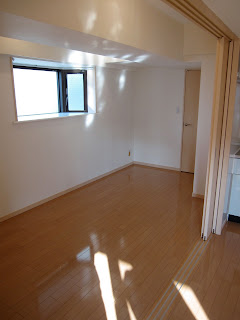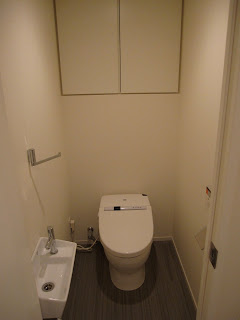**A draft that was never posted back in 2011**
I've recently returned from a trip literally around the world. During my month and a half away, I took the time to relax and forget about the current stresses related to living in Japan. I'd forgotten what it was like for the ground to be constantly moving and was even able to forget about the recent release of information in regards to the Fukushima reactors...
Just in case you missed those reports:
Fukushima Children Found to have Caesium Radiation
Fukushima Reactor Updates
Then there was this release just 3 days ago that again brought with it mixed feelings and reignited some of my concerns about returning to Tokyo ( Fukushima Radiation ).
But who would have guessed that becoming irradiated might be one of the least of my concerns in Japan. It seems that in the past couple of months a Swedish and Japanese scientist have released news of a new strain of treatment resistant Gonorrhea in a Japanese Sex Worker (Antibiotic-Resistant STD). If that article doesn't freak you out enough, maybe this video will (No More Options ).
That's right, radioactive fallout may no longer be my biggest concern this next year in Japan.
At this point you might be saying to yourself, "but STD's are everywhere! Japan has a relatively low incidence compared to other countries! Why not focus on the problems in other countries!"
Well, for one, I live in Japan and what happens here directly affects me. Two, while other countries are actively working to educate their populations on STD's, Japan is falling behind.
"Japan’s Venereal Disease Prevention Law has remained unchanged since it went into effect in 1958."
"Since true sexuality education is absent from Japanese education, and parents and the community no longer communicate this essential information to youths, these magazines do perform an important function, providing limited but basic information about sexual anatomy."
"On the other hand, the actual number of herpes, chlamydia, and trichomoniasis cases is unclear since reporting of these diseases is not required."
Japan Sexology Study - a VERY comprehensive article on sexology in Japan, but rather outdate - 1996
A quick search for 性教育 (seikyouiku - sex education) brought me to this information on the Ministry of education site: Sex Education
I have been here long enough to hear stories of Japanese men and women refusing or not asking to use condoms. I've heard Japanese people claim that STD's are a foreign problem and if a Japanese person got an STD it was probably from a foreigner. Well, there's no doubt now in ANYONE'S mind that STD's are everyone's problem.
Granted, this sort of thing could happen in just about every country. I don't think any country is without its share of problems trying to tackle new cases of STDs. In the US, Gonorrhea has been on the rise (STD Statistics).
So WHY don't Japanese people use condoms?
According to this article (AIDS/HIV in Japan), condom use has fallen from 700 million to 200 million. Not really believing this myself, I did a search for related articles on this statistic. Sadly, the most relevant article I found since this 1981 article ( Cultural Context of Condom Use). It was damn hard to find any information specifically regarding the use of condoms in Japan. Most articles were from news sources who failed to site the source of their statistics and most other sites had conflicting data on condom use and most of the articles are in relation to birth control practices, NOT STD prevention.
This article claims abortion to be the most common use of birth control (Abortion Still the Leading Form of Birth Control).
This site claims that condoms are the most commonly used (Birth Control in Japan)...The first line says that 80% of Japanese use condoms, however if you scroll down and read carefully, you'll find this claim, "Condoms are the most common form of birth control. According to a United Nation study, they are used regularly by 46 percent of couples between the ages of 15 and 49 and by 80 percent of the sexually active public who use birth control." It never does tell you how many couples actually USE birth control, so you really have no idea of what percent of the population actually uses condoms. If you actually open the UN Article it says that only 40% of Japanese use condoms (UN Study).
This scientific article shows that 59% of unmarried women use protection (this includes "withdrawl method"). It seems that more married couples use condoms than non-married couples. But if you read the introduction, the authors show just WHY information is so limited when they say, "In Japan we have only three nationwide serial statistical data sources on contraception." One of those sources is a survey done by the Mainichi Shimbun, a newspaper. The other two sources are directly related to studying FERTILITY information, NOT STD prevention.
I've recently returned from a trip literally around the world. During my month and a half away, I took the time to relax and forget about the current stresses related to living in Japan. I'd forgotten what it was like for the ground to be constantly moving and was even able to forget about the recent release of information in regards to the Fukushima reactors...
Just in case you missed those reports:
Fukushima Children Found to have Caesium Radiation
Fukushima Reactor Updates
Then there was this release just 3 days ago that again brought with it mixed feelings and reignited some of my concerns about returning to Tokyo ( Fukushima Radiation ).
But who would have guessed that becoming irradiated might be one of the least of my concerns in Japan. It seems that in the past couple of months a Swedish and Japanese scientist have released news of a new strain of treatment resistant Gonorrhea in a Japanese Sex Worker (Antibiotic-Resistant STD). If that article doesn't freak you out enough, maybe this video will (No More Options ).
That's right, radioactive fallout may no longer be my biggest concern this next year in Japan.
At this point you might be saying to yourself, "but STD's are everywhere! Japan has a relatively low incidence compared to other countries! Why not focus on the problems in other countries!"
Well, for one, I live in Japan and what happens here directly affects me. Two, while other countries are actively working to educate their populations on STD's, Japan is falling behind.
"Japan’s Venereal Disease Prevention Law has remained unchanged since it went into effect in 1958."
"Since true sexuality education is absent from Japanese education, and parents and the community no longer communicate this essential information to youths, these magazines do perform an important function, providing limited but basic information about sexual anatomy."
"On the other hand, the actual number of herpes, chlamydia, and trichomoniasis cases is unclear since reporting of these diseases is not required."
Japan Sexology Study - a VERY comprehensive article on sexology in Japan, but rather outdate - 1996
A quick search for 性教育 (seikyouiku - sex education) brought me to this information on the Ministry of education site: Sex Education
I have been here long enough to hear stories of Japanese men and women refusing or not asking to use condoms. I've heard Japanese people claim that STD's are a foreign problem and if a Japanese person got an STD it was probably from a foreigner. Well, there's no doubt now in ANYONE'S mind that STD's are everyone's problem.
Granted, this sort of thing could happen in just about every country. I don't think any country is without its share of problems trying to tackle new cases of STDs. In the US, Gonorrhea has been on the rise (STD Statistics).
So WHY don't Japanese people use condoms?
According to this article (AIDS/HIV in Japan), condom use has fallen from 700 million to 200 million. Not really believing this myself, I did a search for related articles on this statistic. Sadly, the most relevant article I found since this 1981 article ( Cultural Context of Condom Use). It was damn hard to find any information specifically regarding the use of condoms in Japan. Most articles were from news sources who failed to site the source of their statistics and most other sites had conflicting data on condom use and most of the articles are in relation to birth control practices, NOT STD prevention.
This article claims abortion to be the most common use of birth control (Abortion Still the Leading Form of Birth Control).
This site claims that condoms are the most commonly used (Birth Control in Japan)...The first line says that 80% of Japanese use condoms, however if you scroll down and read carefully, you'll find this claim, "Condoms are the most common form of birth control. According to a United Nation study, they are used regularly by 46 percent of couples between the ages of 15 and 49 and by 80 percent of the sexually active public who use birth control." It never does tell you how many couples actually USE birth control, so you really have no idea of what percent of the population actually uses condoms. If you actually open the UN Article it says that only 40% of Japanese use condoms (UN Study).
This scientific article shows that 59% of unmarried women use protection (this includes "withdrawl method"). It seems that more married couples use condoms than non-married couples. But if you read the introduction, the authors show just WHY information is so limited when they say, "In Japan we have only three nationwide serial statistical data sources on contraception." One of those sources is a survey done by the Mainichi Shimbun, a newspaper. The other two sources are directly related to studying FERTILITY information, NOT STD prevention.






























